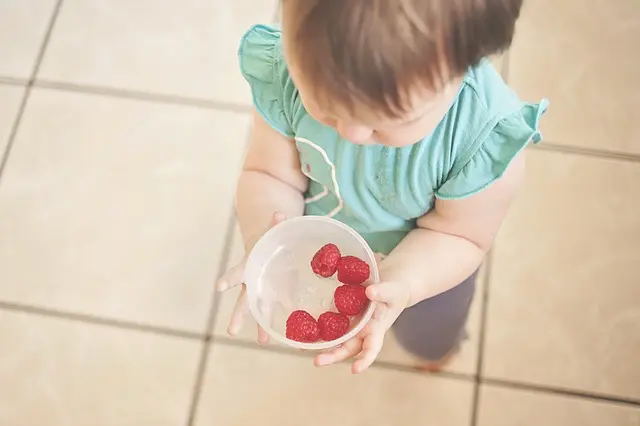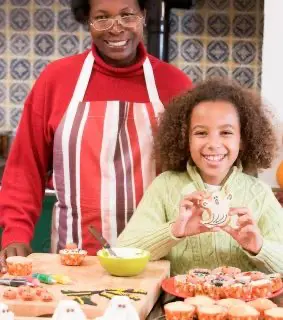Why Won't My Toddler Eat?
by Melissa Ingold

Parents everywhere are asking this same question, and wringing their hands with worry. The doctor says their child is fine, but how can a quick visit to the doctor's office declare anything when they do not know first hand their child's lack of eating. It can be a frustrating and tiring experience for all involved. All you want is to have your child eating a big, healthy meal without force-feeding them, and they don't want anything to do with it.
Toddlers are energetic little beings and they do not seem to want to stop for anything, even food. Therefore, the fight is on. How do we go about ensuring our child's daily nutritional requirements are met?
Through my own experience, I discovered the worse thing I could do was to interrupt my daughter's playtime with mealtime. I slowly realized that I could bring the food to her, instead of taking her to it. So many healthy foods can be provided for children in the form of snacks that can be eaten throughout the day.
For example if she didn't want to sit down to breakfast that day I would offer her dry cereal, grapes, and a glass of milk which I would set out on her child size table. She would then be able to watch television, play with her toys and eat while she was doing so. Then for lunch I would offer her a lunchable which consisted of cheese, crackers and small circles of meat, topped off with fruit juice and a cookie if she wanted one. My daughter is usually good about sitting down with us at the table for dinner and eating something, but there are days when she will nit-pick and want down. Instead of giving into her, I would offer her fresh vegetables such as baby carrots and cucumbers, sliced apples or canned fruit, cheese, yogurt, applesauce, and just about anything, that would appeal to her. When finished with her supper, I would give her a Flintstone multi-vitamin and she would chew it up like candy. This was to make sure she that she received any vitamins and minerals that she did not get throughout the day. Remember to always read the label before giving your child anything.
There are many ways to get around a toddler who will not eat. Get creative and offer a variety of interesting snacks they will have fun eating.
Below is a guideline based on "average servings for toddlers
from the book, What to Expect, The Toddler Years,' written by Arlene Eisenberg, Heidi E. Murkoff, and Sandee E. Hathway, B.S.N.
Protein: 4 toddler servings
- ¾ cup milk
- 1/2 cup yogurt
- 1/4 oz hard cheese
- 1 1/2 tablespoons peanut butter
Calcium Foods: 4 toddler servings
- 2/3 cup of milk
- 1/2 cup calcium added milk
- 1/2 cup yogurt
- 4 oz calcium fortified orange juice
Vitamin C Foods: 2 or more toddler servings
- 1/2 small orange
- 1/4 fresh strawberries
- 1/8 small cantaloupe
- 1/4 fresh or frozen orange juice
- 1/4 cup broccoli
- 1/2 cooked leafy greens
- 1 small tomato skinned
- ¾ cup tomato juice or 1/2 cup of sauce
Green leafy and yellow vegetables and yellow fruits: 2 or more toddler servings
- 1/2 cubed cantaloupe
- 1/8 large mango
- 1 medium nectarine
- 1/2 large yellow peach
- ¾ cup peas
- 1/4 of small carrot
Other fruits and vegetables: 1 to 2 or more toddler servings
- 1/2 apple, pear or banana
- 1/4 applesauce
- 1/3 cup cherries, berries or grapes
- 3 dried peach halves
- 1 dried pear half
- 1/2 slice fresh or canned pineapple
- 2 tablespoons raisins, currants or dried apple rings
- 3/8 cup of green beans
Whole grains and other concentrated complex carbohydrates: 6 or more toddler servings
- 1 tablespoon wheat germ
- 1/2 slice whole-grain bread
- 1/2 small whole wheat pita
- 1/4 whole grain bagel or English muffin
- 1/4 cup brown or wild rice
Iron rich foods: Some everyday
- Iron fortified cereals
- Beef
- Whole grains
- Wheat germ
- Baked goods made with soy flour
- Dried peas and beans
High-fat foods: 5 to 8 toddler servings a day in the second year; 5 1/2 to 8 1/2 in the third year
- 1/2 tablespoon butter, margarine, canola oil, olive oil, mayonnaise
- 1 1/2 tablespoon cream cheese
- 1 tablespoon peanut butter
- 1 egg
- 1 1/2 cups 2% milk
- 1/2 cup ice cream
- 1/2 small slice of pizza
- 9 french fries
- ¾ kid size burger
- 2 chicken nuggets
Salty foods: Restrict added salt!
Fluids: 4 to 6 cups daily, additional fluids are needed in hot weather and when your child is ill.
From the above toddler servings guide, your toddler is getting more then you think when it comes to nutrition guidelines. You will still have days when you become frustrated by your child's lack of eating, but the next day they may make up for it. Your child will eat what he/she needs, when they need it.
They will not starve or overfeed themselves; they will eat what they need for normal growth. It is up to us to provide our children with the healthy foods they need.
Melissa Ingold is a writer as well as a mother. She has a degree in Early Childhood Education, but has recently made the decision to be a stay-at-home mom. Her experience with children has enabled her to write articles on the various aspects of child development from a mother's point of view. She touches on the issues that concern us as parents, and provides insight and solutions to our children's many developmental stages.
Potty Training
Why Won't My Toddler Eat?
Choosing a Kids Camp
About Us-
Contact Us -
Privacy Policy©2023 TheParentVine.com a brand owned by GADL Enterprises, LLC. All rights reserved.
TheParentVine.com earns commissions on products sold.



